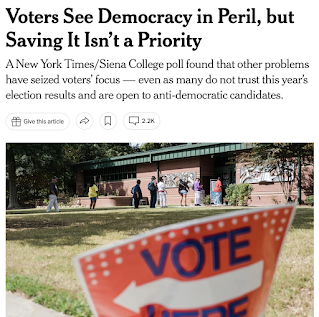"Inflation is a priority that government and central banks are expected to tackle."
Summary of 11-country poll by Global Progress/YouGov
The ground is shifting politically. It is bad for Democrats.
The election may be a referendum on inflation. Not Trump. Not abortion. Not overthrowing elections. Americans know that our democracy is at risk, but they just don't care all that much. It isn't a priority. Nor is abortion. |
| New York Times |
Briefly, abortion looked like a silver bullet for Democrats. That may be a misfire. The Dobbs decision and Republican legislatures implementing total bans on abortion were presumed to energize young voters. The ballot issue in Kansas sent a misleading signal. It was a single up-or-down vote on the topic, not a vote on the salience of abortion as an issue.
 |
| Texas Tribune |
I just don’t think people understand that women are going to die. I don’t think people understand the urgency of the issue.
Abortion bans are law in Texas. The article cites polls that show that 80% of Texas voters think the Texas law goes too far. The Texas Tribune reports it is the ninth most important issue to Texas voters. Election denial isn't a deal-killer either. Abbott refused to acknowledge Biden's 2020 victory after the election. This year he has been campaigned with Trump in Texas and joined Trump in saying fraud took place. A Democratic candidate for governor, Beto O'Rourke gives Texas voters a clear choice on abortion and election denial. He currently lags Abbott by five to 11 points.
I may be wrong and out of touch. I thought that overthrowing elections and total abortion bans would be over-riding issues in the general election. Surely Americans who stand for the Star Spangled Banner won't support candidates who tolerate overthrowing a presidential election. Surely a total abortion ban goes too far. Most people agree with me on those issues. My error is thinking that those issues are the important ones.
Incumbent governments in Western democracies are being replaced. We are in an era of political turmoil, most vividly in the U.K. Democracy and abortion are abstractions. The price of food and gasoline are practical realities.
Republicans in America have no different or better solution to inflation than do Democrats. Cut military spending? Cut Social Security and Medicare? Let in more immigrants so they can bring down the cost of agricultural labor? Raise taxes to reduce net demand? Fat chance. But that is no matter. If voters think the current government is incompetent to deal with inflation, they will change leadership.
[Note: To get daily home delivery of this blog go to https://petersage.substack.com Subscribe. The blog is free and always will be.]









